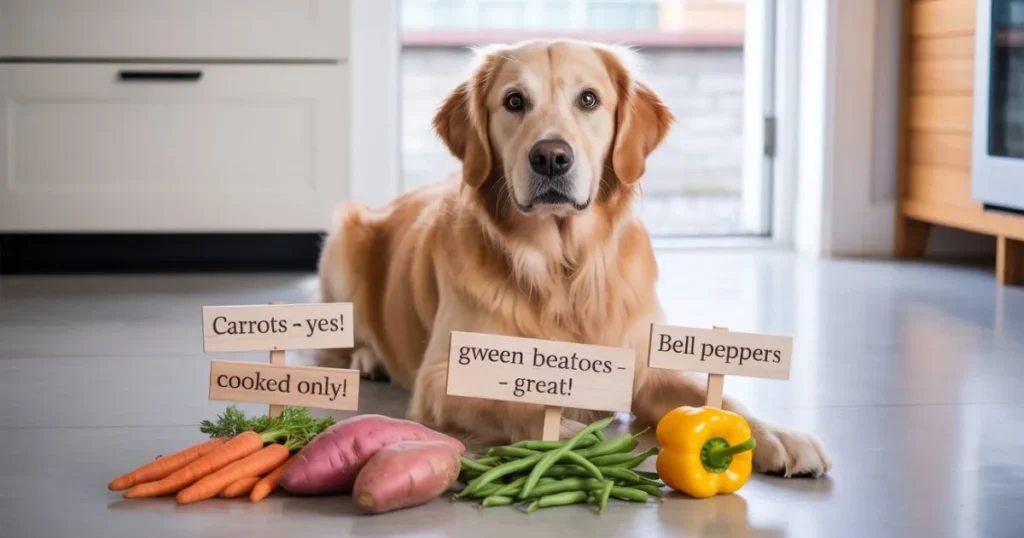❤️ A Personal Note to Dog Parents: Because They Deserve the Best
Your dog isn’t just a pet; they’re family. From their wagging tail to their soulful eyes, they bring joy and comfort into your life. And when it comes to sharing meals, it’s tempting to offer them a bite of your food. But before you pass over that carrot stick or leafy green, it’s crucial to know which vegetables are safe for your canine companion. After all, their health and well-being are in your hands.
🥕 Why Vegetables Matter in Your Dog’s Diet
While dogs are primarily carnivores, incorporating vegetables into their diet can offer numerous health benefits. Vegetables provide essential nutrients, fiber, and antioxidants that support overall health. They can aid in digestion, promote a shiny coat, and even help maintain a healthy weight. However, not all vegetables are suitable for dogs, and it’s essential to know which ones to include and which to avoid.
🥬 Safe Vegetables Dogs Can Eat
Introducing safe vegetables into your dog’s diet can be a delightful experience for both of you. Here are some dog-friendly vegetables:
🥕 Carrots
Carrots are low in calories and high in fiber, making them an excellent choice for dogs. They also contain beta-carotene, which supports healthy vision. Offering raw or steamed carrots can provide a satisfying crunch and promote dental health.
🥦 Green Beans
Green beans are rich in vitamins and low in calories, making them a healthy snack for dogs. They’re also high in fiber, which can aid in digestion. Serve them steamed or raw, but avoid canned versions with added salt.
🥒 Cucumbers
Cucumbers are hydrating and low in calories, making them perfect for overweight dogs. They’re also rich in vitamins K, C, and B1, as well as potassium and magnesium. Serve them sliced and plain, without any added seasonings.
🍠 Sweet Potatoes
Sweet potatoes are packed with vitamins A, C, and B6, as well as fiber. They support healthy digestion and provide a natural source of energy. Always cook sweet potatoes thoroughly and serve them in small amounts.
🧄 Bell Peppers
Bell peppers are filled with vitamins A, B6, and E, lutein, and antioxidants like vitamin C and beta-carotene. They can help promote skin, coat, and eye health for your dog. Serve them raw or lightly cooked, ensuring they’re cut into small, manageable pieces.
🥬 Lettuce
Lettuce is low in calories and full of fiber, making it a great option for dogs. It’s also 90% water, aiding in hydration. Romaine, arugula, and iceberg lettuce are all safe for your dog, but spinach and kale should be avoided in large amounts due to potential health concerns.
🥦 Zucchini
Zucchini is low in calories and high in fiber, making it a healthy treat for dogs. It’s also rich in vitamins A, C, B6, and K. Serve it raw or steamed, ensuring it’s cut into small pieces to prevent choking hazards.
🥔 Cooked Potatoes
Cooked potatoes are a good source of carbohydrates and essential nutrients. However, they should always be served cooked and plain, without any added butter or seasoning. Never feed your dog raw potatoes, as they can be toxic.
🚫 Vegetables Dogs Should Avoid
While many vegetables are safe for dogs, some can be harmful or toxic. It’s essential to be aware of these to ensure your dog’s safety.
🧄 Onions, Garlic, Chives, and Leeks
These vegetables belong to the Allium family and can cause serious health issues in dogs, including damage to red blood cells and potential organ failure. Symptoms of toxicity include vomiting, diarrhea, and lethargy. Always avoid feeding these to your dog.
🍄 Wild Mushrooms
Wild mushrooms can be highly toxic to dogs and can lead to severe health problems. Always ensure that any mushrooms fed to your dog are store-bought and safe for canine consumption.
🍅 Tomatoes (Unripe)
While ripe tomatoes are generally safe for dogs, unripe tomatoes and the green parts of the tomato plant contain solanine, which can be toxic. It’s best to avoid feeding tomatoes to your dog altogether.
🥬 Spinach
Spinach contains oxalates, which can interfere with calcium absorption and lead to kidney issues in susceptible dogs. While small amounts are generally safe, it’s better to opt for other leafy greens.
🌰 Corn on the Cob
While corn kernels are safe for dogs, the cob can pose a choking hazard and may cause intestinal blockage. Always remove the cob before offering corn to your dog.
🥗 How to Introduce Vegetables to Your Dog’s Diet
Introducing new foods to your dog’s diet should be done gradually to monitor for any adverse reactions. Here’s how to do it safely:
- Start Small: Begin with a small portion of the new vegetable and observe your dog for any signs of allergies or digestive upset.
- Prepare Properly: Wash vegetables thoroughly, cook them if necessary, and cut them into small, manageable pieces.
- Monitor Reactions: Keep an eye on your dog for any changes in behavior, appetite, or stool consistency.
- Consult Your Veterinarian: Before introducing a new vegetable, especially if your dog has existing health conditions, consult your veterinarian.
📋 Vegetable Feeding Chart for Dogs
| Vegetable | Safe? | Preparation Tips |
|---|---|---|
| Carrots | ✅ | Raw or steamed, cut into small pieces |
| Green Beans | ✅ | Steamed or raw, avoid canned with salt |
| Cucumbers | ✅ | Sliced and plain |
| Sweet Potatoes | ✅ | Cooked thoroughly, no seasoning |
| Bell Peppers | ✅ | Raw or lightly cooked, cut into pieces |
| Lettuce | ✅ | Chopped, avoid spinach and kale in excess |
| Zucchini | ✅ | Raw or steamed, cut into small pieces |
| Cooked Potatoes | ✅ | Plain, no butter or seasoning |
| Onions | ❌ | Never feed |
| Garlic | ❌ | Never feed |
| Wild Mushrooms | ❌ | Never feed |
| Unripe Tomatoes | ❌ | Never feed |
| Spinach | ⚠️ | In moderation, avoid in large amounts |
| Corn on the Cob | ⚠️ | Avoid the cob, kernels are safe |
❓ FAQ – What Vegetables Can Dogs Eat?

Can dogs eat raw vegetables?
Yes, many vegetables are safe for dogs when served raw. However, it’s essential to wash them thoroughly and cut them into small pieces to prevent choking hazards.
Are there vegetables that help with dog constipation?
Yes, vegetables like pumpkin and sweet potatoes are high in fiber and can aid in digestion, helping to alleviate constipation in dogs.
What vegetables can dogs eat every day?
Carrots, green beans, and cucumbers are safe for daily consumption in moderation. Always ensure variety and balance in your dog’s diet.
